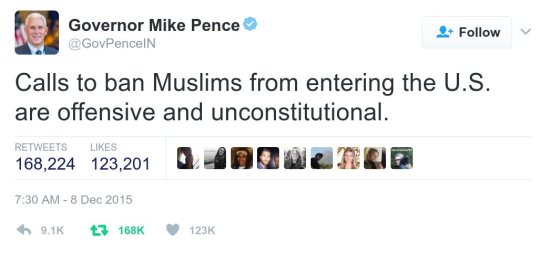Steven Brust:
And so on. There is, as we see, a huge range of reasons in the case of voting for Secretary Clinton. Why is it, then, that when it comes to the Trump voter, you create this image in your mind of not only who he is, but exactly why he voted for Trump? He is a white male (obviously) and a sexist, and a bigot, and homophobic. Or, at any rate, doesn’t have problems with racism and sexism and homophobia, because that is all Trump ever talked about and no one could possibly see it any different.
It does not seem to occur to you that, just as some of you were in denial about or excused or justified or ignored Secretary Clinton’s Wall Street connections, her actions in Haiti, in Libya, in providing enthusiastic aid to President Clinton’s racist and anti-working class “war on drugs,” that some of these people were in denial about or excused or justified some of Trump’s positions.
Of course, if your goal is to feel morally superior, then fine, please keep your image of the Trump voter intact and move on with your life. And if your political position starts and ends with the question of whether to “be kind,” then feel free to be kind or not be kind to whomever you please.
But we are now living in a country in which the chief executive officer is a fascistic demagogue, and in which police state measures are being introduced even faster than I had thought they would be. I beg to submit that to fight him effectively is going to take hard work, it is going to take organizing, it is going to take thinking things through, and it is going to take some of the 63 million people who voted for him. I further beg to submit that immense numbers of them will come to hate him, and for good reason. If fighting Trump seems more important than feeling morally superior, then it might be worth your while to consider that there might be more going on in the thinking of those 63 million people than the image of them you’ve created in your head.
I freely admit, this can be dangerous. It might lead you toward questions you don’t care to look at, such as, how far has capitalism degenerated when such an election can take place, an election that was conducted somewhere below the level of discourse one finds in a junior high locker room? You might need to consider that such easy answers to what happened as, “The Republicans lied,” ignore the fact the Republicans (and the Democrats, but skip that) have been lying for decades. You might need to consider that there have been Trump equivalents floating around for at least a century, but now, at this point in history, one got elected. You might need to consider, why did so many people find the idea of “more of the same” so utterly unacceptable? You might start thinking that glib answers such as, “they’re racists,” and “they’re sexist” bring up more questions than they answer. You might come to realize that the machinations and maneuvering of the two parties of big business are far more a reflection of and reaction to the state of capitalism than a determinate. You might even discover the immense suffering of those people who you’ve been assured have no problems except what’s in their heads.
http://dreamcafe.com/2017/01/30/the-mythical-trump-voter/








